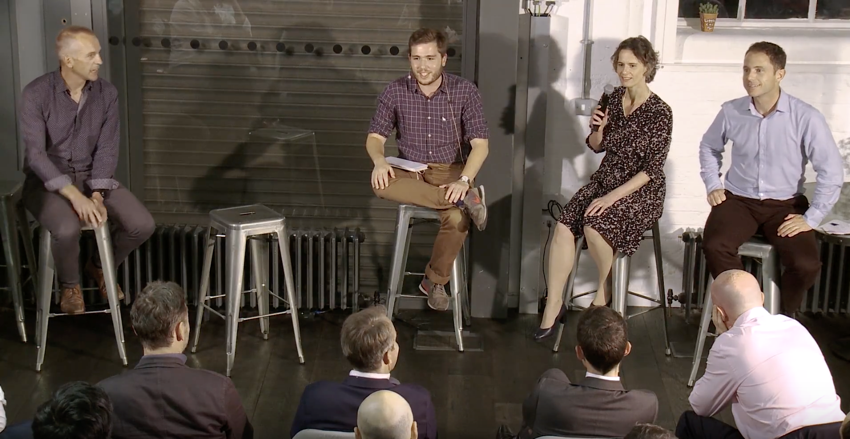
Can people be persuaded to love their insurer?
That was just one of the questions that more than a hundred people set out to explore at the first ever Balderton Debates night, held at our Kings Cross offices in September of 2017.
Insurtech is a fast growing part of the UK’s fintech sector but it’s fair to say it doesn’t attract as much excitement or attention as other aspects of fintech.
This industry is worth $3.7tn globally, of which almost all adults are customers, and is ripe for disruption.
and
(1)
Insurance is an enforceable obligation to respond to the occurrence of an uncertain event, according to Imran Akram, general partner at AXA Strategic Ventures. He argued that you can deliver the product online, you can find the customers online; you can charge by the year, the day, the minute; pay through an app and verify identity with a text and a smart phone camera, but at the end of the day all that you have changed is distribution and marketing. The core insurance product remains the same and that has to be regulated.
(2)
To disrupt the insurance sector, you need to be able to underwrite, otherwise you are only taking money from the brokers. To really disrupt the sector - and to take control of pricing each risk - an insurtech company needs a licence and must convince the regulator that all these new data sources allow them to calculate risk in a better way, Akram argued.
(3)
All it takes to disrupt the insurance industry is a consumer-centric offering, built around the needs of customers. You also need to find ways to access your customers through search and social networks, which will help you to understand what they are looking for, argued Steven Mendel, co-founder of Bought By Many.
(4) In insurtech the battle is between the startup and the incumbent, and whether the startup can get distribution before the incumbent can innovate. There is lots that can be done to add value, without the need for a licence, said Freddy Macnamara, co-founder and ceo of Cuvva.
(5)
How Prudential become “The Pru”
At the time of World War I, 30% of UK citizens had life insurance with the Prudential. There were 860,000 UK citizens killed during the war. The Pru did not have to pay out on these claims as deaths through war were excluded. Their decision to pay out on 300,000 claims for those killed in the war was a deliberate choice to remain loved and central to the needs of British consumers. Hence Prudential became “The Pru”.
(6)
Insurers have screwed up their relationship with their customers, argued Rob Devey, a former head of UK insurance at the Pru, who now is a partner at Octopus Investments and an active insurtech investor.
(7)
Regulation of the insurance sector prompted consolidation across the industry.However, with scale has come complexity and poor customer service. This is why the relationship between the insurer and customer has deteriorated and why there is a huge opportunity for new entrants to disrupt the sector.
(8)
Technology allows insurers to offer mass customisation.Once insurers take the opportunity to service the entire customer lifestyle, customers will love them again, Devey reckons.
(9)
Insurance can’t inspire a feeling of love, but it can inspire trust, according to Sophie Dingreville, investment director at Munich Re/ HSB Ventures. People buy it when they are forced to. After buying, the only time they are in touch with their insurer is at times of huge pressure, stress, loss and anger.
(10)
Consumers generally know the title and amount of cover they have, but little else.Insurers need to provide more transparency around what is covered and tell their customers clearly when they are about to fall outside the bounds of the coverage - so that they can make sure that they are buying the cover they need.
(11)
Insurance is contentious because insurance companies don’t pay out and customers don’t know what they are covered for. Customers assume they won’t be paid, so they exaggerate their loss.
(12)
Technology could bring new ways to engage customers and share data and expertise, which could help improve customer loyalty and trust. It should also bring new ways to process claims. It is harder to lie on a video call.
(13)
For many people, insurance is actually a bad financial product. Over the course of a life, most people lose out on insurance. They pay out a lot and rarely claim. Over 20 years, the insurance industry has disempowered customers with marketing that promises to take customers “under our wing”.
(14)
Insurers could win back trust by moving to protection and prevention.Already insurers have the data that could help save customers from events that can happen. By helping customers to not get into trouble in the first place, it would help to rebuild trust.
In conclusion, the optimists in the room carried the day. They thought it was possible to disrupt the insurance industry without a licence and, at the same time, they thought it was possible for people to be persuaded to love their insurer. Both incumbents and startups should feel reassured by the latter.
Thanks to everyone who spoke with such conviction and the audience for really helping to make the debate flow. Plus special thanks to Oscar Williams Grut, Business Insider’s fintech expert who chaired the debate.
Sign up for our newsletter to stay up to date on news from Balderton, and our portfolio.